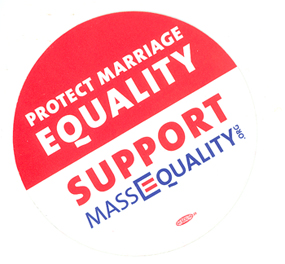Background on MassEquality

MassEquality sticker.
Formed in the late 1990s as an informal coalition of national and local organizations, MassEquality is dedicated to fighting for the legalization of same-sex marriage. Eventually, the loose coalition of the 1990s transformed into a well-organized coalition working to oppose legislation that would officially ban same-sex marriage. The defining moment for MassEquality came on November 18, 2003, when the Massachusetts Supreme Judicial Court decided in favor of marriage equality in Goodridge v. Department of Public Health, ruling that the denial of the protections, benefits, and obligations of civil marriage because that person was married to a person of the same sex was a violation of the Massachusetts state constitution. The court went to tate that a gay marriage ban "works a deep and scarring hardship on a very real segment of the community for no rational reason." Goodridge v. Department of Public Health reignited MassEquality and provided the coalition with the momentum needed to become a powerful advocacy organization. Since its first inception, MassEquality has grown from a small unfunded coalition to a multi-million dollar campaign with over ninety coalition partners, a membership base of 40,000, a statewide grassroots volunteer structure, a strong presence in the media, and a statewide reputation within policy circles as a significant political force.
In the years after Goodridge, the Commonwealth faced a flurry of referenda and proposed amendments to the state constitution to ban same-sex marriage, and MassEquality expanded and strengthened its infrastructure to in defense. In particular, House Bill 3190, the Marriage Affirmation and Protection Amendment, not only proposed to ban same-sex marriage in Massachusetts, but to prohibit civil unions and domestic partnerships as well, denying same-sex couples and their families health insurance benefits, access to pension and Social Security benefits, and automatic hospital visitation rights. This amendment narrowly passed during the first Constitutional Convention in March 2004, but was defeated at the required second Convention the following September, by which time over 10,000 people had entered into same-sex marriages in Massachusetts.
Following the unsuccessful effort to alter the state constitution, opponents of same-sex marriage launched a citizen petition initiative, hoping that the issue would pass the legislature with the required fifty votes and be put to a popular vote. The signature gathering process, however, became highly contentious, with allegations that the firms hired to gather signatures -- which were paid per signature -- fraud misrepresented themselves to increase their numbers, posing as supporters of a proposal to end the ban on beer and wine sales. MassEquality received a total of 2,202 reports of fraud relating to the petition effort and quickly responded with a publicity campaign to alert the public of the allegations. Regardless of the potential irregularities, opponents of same-sex marriage gathered enough support to force a vote in the legislature. In July 2006, the referendum to ban same-sex marriage passed the state House with the more than the required fifty votes, however in the ensuing Constitutional Convention of November 2006, the legislature voted 109 to 87 to postpone the vote until the end of the legislative session. On January 2, 2007, the anti-gay amendment was defeated with a final vote of 62-134.
In order to turn back anti-gay legislation, MassEquality divided its efforts into two separate entities. MassEquality.org worked as a 501(c)4 advocacy organization that organized people and resources to defeat anti-gay constitutional amendments. The MassEquality Educational Fund was created as a 501(c)3 charitable organization that focused on educating the public about the need for marriage protections for gay and lesbian families. MassEquality.org focused their efforts towards the legislature, legislators, and other influential people, the audience for the Educational Fund, in contrast, are the voters in Massachusetts who have yet to make up their mind about same-sex marriage.
In July 2004, another advocacy group, the Freedom to Marry Coalition, joined forces with MassEquality to become the fiscal sponsor of the MassEquality Educational Fund. Founded in 2003 as an educational organization, Freedom to Marry was experienced in working with states to pass same-sex marriage laws and to overturn the federal Defense of Marriage Act (DOMA). Together, MassEquality and Freedom to Marry have successfully blocked attempts to pass any anti-gay legislation and have brought the issue of same-sex marriage to a broader audience.
MassEquality continues to fight for equality for the LGBT community. They have focused their efforts on equality for transgender members of the community, and protections for LGBT youth and the elderly. They continue to work to build a pro-equality majority in state legislatures and to help LGBT victims of domestic violence who are often not properly understood or addressed by traditional service organizations. The Freedom to Marry Coalition continues to work for the repeal of the federal DOMA and to bring same-sex marriage to more states.

